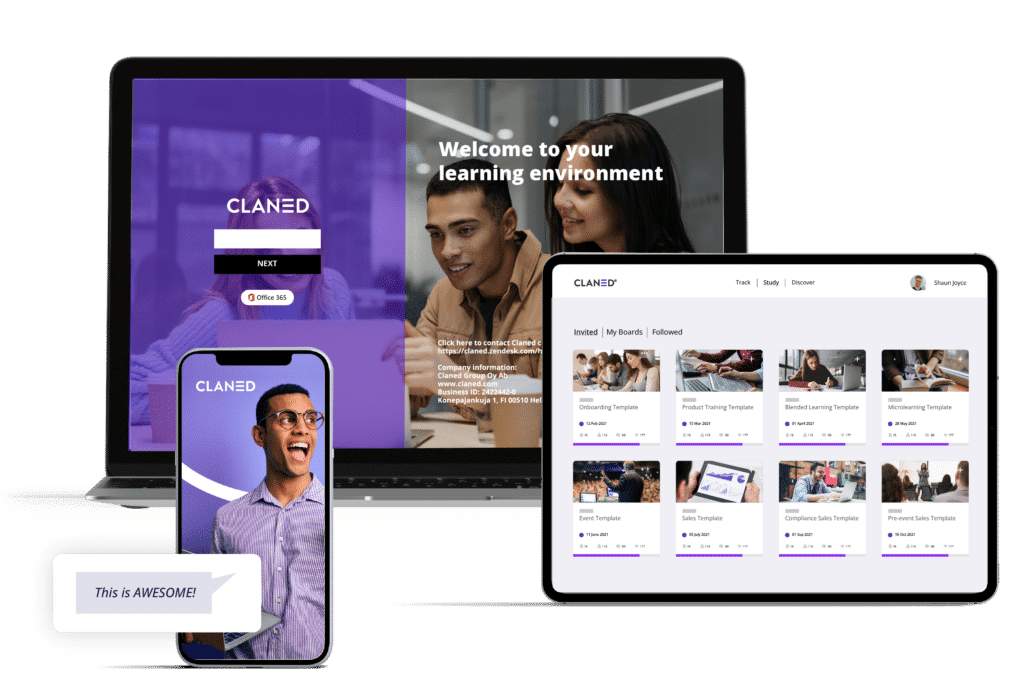Imagine equipping your team with superpowers – that’s what product knowledge training essentially does. It transforms employees into brand superheroes, armed with in-depth understanding and insights about the products or services their company offers.
This type of training ensures that team members are not just familiar with the inventory but can confidently discuss features, benefits, and even the intricate details that set them apart from the competition.
In a market where consumers are bombarded with choices, the importance of product knowledge training cannot be overstated. A well-informed employee is a company’s best asset; they become the go-to source for information, building trust and credibility with customers.
Employees across various departments benefit immensely from this training:
- Sales teams: They can tailor their pitches to highlight how features meet customer needs.
- Customer service representatives: They resolve issues with precision, turning potential frustrations into positive experiences.
- Marketing professionals: They craft messages that resonate deeply with the target audience because they know exactly what makes their product stand out.
By investing in product knowledge training, companies empower their workforce to excel in their roles and contribute significantly to the organization’s success.
Lets dive into this guide to help you achieve success in your product knowledge training.
Why is Product Knowledge Important?
Product knowledge importance cannot be overstated. It serves as the backbone of every successful business, irrespective of its size or industry. But why exactly is product knowledge training so crucial?
Boosting Employee Confidence and Customer Trust
Having a thorough understanding of the products or services offered allows your employees to articulate their benefits effectively to customers. This not only boosts their confidence but also establishes them as reliable sources of information in the eyes of consumers.
Improving Internal Communication
Product knowledge can drastically improve communication within the company. With every department aware of the ins and outs of the products, potential miscommunications can be significantly reduced, ensuring a more streamlined operation.
Enhancing Customer Service and Satisfaction
Well-informed employees are better equipped to handle customer inquiries and complaints. They can provide accurate information promptly, reducing resolution times and enhancing customer satisfaction.
Gaining a Competitive Edge
The business landscape is fiercely competitive; companies must strive to differentiate themselves from their competitors. And what better way to stand out than by showcasing superior product knowledge? By thoroughly understanding your offerings, your team can highlight unique features and benefits that set your products apart.
In essence, whether it’s enhancing employee confidence or customer satisfaction, improving internal communication, or gaining a competitive edge, product knowledge holds immense significance across all fronts.
The Key Benefits of Product Knowledge Training
When it comes to the advantages of product knowledge training benefits, it’s important to understand how they affect every aspect of customer interaction and organizational success.
1. Enhanced Customer Service
- Empowering Customer Service Representatives: With in-depth product knowledge, customer service reps become confident problem solvers. They can quickly handle complex inquiries and resolve customer concerns with accuracy, resulting in more effective and satisfying interactions.
2. Improved Sales Performance
- Boosting Confidence and Credibility: Sales teams with comprehensive product understanding can effectively highlight key features and benefits that resonate with potential buyers. This knowledge builds confidence, establishes credibility, and can have a significant impact on closing deals.
3. Consistent and Accurate Product Information
- Maintaining a Unified Brand Message: Regular training updates ensure all team members are aligned, providing customers with reliable and consistent product information. This unified approach prevents misinformation and maintains the integrity of your brand’s message.
4. Increased Customer Satisfaction
- Creating Memorable Brand Experiences: Customers value meaningful conversations that enhance their buying journey. When employees engage customers with knowledgeable recommendations and advice, it not only meets but often exceeds expectations, strengthening brand loyalty.
By investing in product knowledge training, companies establish a foundation for excellence that influences every customer touchpoint. It’s clear that such training is not just an internal process but a strategic move towards building lasting customer relationships.
When exploring the range of learning platforms designed to enhance these benefits, it’s evident that tools like Online Learning Platform stand out by offering innovative solutions for delivering impactful product knowledge training programs.
Implementing an Effective Product Knowledge Training Program
Implementing product knowledge training programs require a strategic approach, and one of the first steps to consider is identifying the training needs for different departments and roles.
1. Identifying Training Needs for Different Departments and Roles
Every role in an organization has unique responsibilities, and the depth of product knowledge needed varies accordingly. For example, a salesperson might need a thorough understanding of all product features to pitch the products effectively to clients, while a customer service representative needs to know how to troubleshoot common issues that customers might face with the product.
Tailoring the training content to suit these specific needs is crucial. This is where a training needs analysis comes in handy – it helps determine what each team needs to learn about your products or services.
Sales Team
For sales teams, comprehensive knowledge about product features, benefits, competitive advantages, and pricing strategies is imperative. They should be equipped with information that can help them convince potential customers about why your product or service is the best choice.
Marketing Team
The marketing team, on the other hand, will focus more on how the product fits into the overall brand story and market positioning. They need to understand the unique selling points (USPs) of your products or services to create compelling advertising campaigns and promotional materials.
Customer Service Team
Customer Service Representatives (CSRs) are often on the front lines of answering customer inquiries and resolving issues. They should have a deep understanding of how your products or services work, common troubleshooting steps, warranty details, and return policies.
Departmental Training
When designing departmental training modules, it’s important to consider the unique learning styles and preferences of each team. For instance:
- Sales teams may benefit more from role-play exercises simulating client meetings.
- Customer service reps might prefer hands-on demonstrations showing how to resolve common customer issues.
A well-designed product knowledge training program that considers the unique needs of different departments can lead to:
- Increased efficiency
- Better customer service
- Enhanced overall performance.
In the next section, we will delve into how to design engaging training courses and materials that cater to these diverse learning needs.
2. Designing Engaging Training Courses and Materials
Creating interactive and engaging learning experiences is key to successful product knowledge training. It’s not enough to merely present facts about a product or service. Employees need to fully understand its attributes, how it meets customer needs, and how it stands out in the market.
Incorporate a variety of teaching methods
To accomplish this, consider integrating a variety of teaching methods into your training courses:
- Visual aids: Diagrams and infographics can enhance comprehension and retention of complex information.
- Role-playing exercises: These can help employees empathize with customer perspectives and understand the practical application of the product knowledge they acquire.
Utilize eLearning platforms for course creation
Incorporating eLearning platforms for course creation into the training strategy can significantly boost engagement levels. These platforms come equipped with features designed to enrich learning experiences:
- Easy Course Creation: With ready-made templates, designing comprehensive courses becomes a breeze.
- Interactive Materials: Contextual commenting within learning materials promotes discussions and reinforces understanding.
- Collaboration Tools: Social media-like interaction boosts engagement and promotes collaborative learning.
- Real-time Tracking: Prevent dropouts by monitoring learner progress in real-time.
While traditional classroom settings offer the advantage of face-to-face interaction, online platforms provide flexibility – allowing learners to access courses anytime, anywhere.
This capacity is particularly beneficial for organizations with remote teams or those looking to provide continuous learning opportunities outside of working hours.
Tailor content based on departmental training needs analysis
Remember that one-size does not fit all when it comes to designing training courses. Tailoring content based on departmental training needs analysis will ensure that the course material is relevant and valuable to each learner.
For instance, sales personnel might benefit from detailed information about product specifications while customer service staff may require more focus on troubleshooting common issues.
To sum up, implementing product knowledge training programs requires thoughtful design of engaging courses that cater to diverse learning preferences and job roles. Leveraging the power of eLearning platforms can make this task easier and more effective.
3. Blending Different Learning Methods
A successful product knowledge training program leverages the strengths of various learning methodologies to achieve optimal results.
Particularly, in an era where technology is reshaping corporate training, a blended learning approach can be instrumental. This strategy combines traditional instructor-led training with online education materials, allowing employees to learn at their own pace while still benefiting from face-to-face instruction.
The Benefits of Blended Learning
Blended learning brings together the best of both worlds – the personal touch of on-site training and the convenience and flexibility of e-learning.
For instance, employees can attend interactive workshops or seminars that allow them to ask questions and participate in hands-on activities, such as role-playing scenarios or product demonstrations. Afterward, they may engage with self-paced online modules to reinforce what they’ve learned.
This approach is highly effective for several reasons:
- Personalized Learning Paths: Not every employee learns in the same way. Some may prefer reading material while others learn better through interactive activities or video content. A blended approach can accommodate these different learning styles, ensuring all employees have an equal opportunity to acquire essential product knowledge.
- Reinforcement and Repetition: The combination of instructor-led training and online materials allows for repeated exposure to the information, which increases retention rates.
- Flexibility: With online components, employees can access the materials anytime and anywhere. This not only accommodates busy schedules but also enables learners to revisit certain topics if necessary.
Implementing Blended Learning with Claned
Claned LMS aid in implementing this blended learning approach effectively. we offer an array of features such as course creation using any of your digital materials, interactive materials with contextual commenting for discussions within materials, real-time tracking of learner progress, and data collection for analysis to improve courses and organization KPIs.
Remember that it’s essential to conduct a thorough training needs analysis before implementing product knowledge training programs. Understand your team’s unique needs and tailor your strategy accordingly. Departmental training may vary in structure, content, and delivery method.
Incorporating a blend of learning methods into your product knowledge training program can lead to more engaged learners, better knowledge retention, and ultimately, an improved customer experience.
Product Knowledge Training Examples You Can Use
In the quest to ramp up your team’s expertise, consider these Product Knowledge Training Examples and ideas that are both practical and effective:
1. Role-Playing Scenarios
Employees take on different roles in simulated interactions, navigating through common customer questions or concerns. This can be especially beneficial for sales and customer service teams to practice handling objections and providing accurate product information.
2. Interactive Quizzes and Games
Transform learning into a dynamic experience with quizzes that challenge employees on product features, uses, and benefits. Introducing leaderboards can add a competitive edge that triggers engagement.
3. Product Demonstration Videos
Create a library of high-quality videos demonstrating the product in action. These can serve as visual aids that complement textual information and help learners grasp complex functionalities with ease.
4. Group Discussions and Forums
Utilize online platforms to host group discussions where employees share experiences, ask questions, and learn from each other’s insights. It’s social learning at its best.
5. Case Studies
Present real-life scenarios where the product solved a specific problem or provided significant value. Case studies encourage learners to think critically about the application of product knowledge in various situations.
By integrating these examples into your training program, you equip your team not just with facts but also with the confidence to use that knowledge effectively.
With a variety of tools at their disposal, employees are more likely to engage with the material, retain information, and apply it in real-world contexts.
Key Features to Consider When Choosing an LMS for Product Knowledge Training
Selecting the right Learning Management System (LMS) is crucial for the success of product knowledge training. Here are some essential LMS features that significantly impact the delivery and effectiveness of training programs:
Social Learning Capabilities
- Interactive Discussion Forums: Look for an LMS that facilitates interaction among learners. Discussion forums where employees can ask questions, share insights, and discuss real-world applications of product knowledge enhance the learning experience.
- Peer Collaboration Tools: Features that enable learners to work together on projects or study collectively can solidify understanding and encourage a team-oriented approach to learning.
User Management
- Intuitive User Interface: An easy-to-navigate platform ensures learners do not get frustrated or lost, keeping them engaged with the content.
- Flexible Access Controls: An LMS should allow administrators to easily manage user roles and permissions, catering to different departments and their specific access needs.
- Scalability: As your company grows, your LMS should effortlessly scale up to accommodate more users without compromising performance.
Certification Capabilities
- Automated Certificate Generation: After successful course completion, the system should automatically issue certificates, adding value to the training by acknowledging achievement.
- Validity Tracking: Maintain a record of certification validity periods to ensure employees’ product knowledge stays current with refresher courses as necessary.
Assessment Tools
- Varied Testing Formats: To accurately gauge understanding, an LMS should offer multiple assessment formats such as quizzes, simulations, and scenario-based evaluations.
- Instant Feedback: Providing immediate results and corrective feedback encourages learners to understand their mistakes and grasp concepts better.
Learning Analytics
- Accurate Data Tracking: Robust analytics tools enable administrators to track learners’ progress, identify knowledge gaps, and measure the effectiveness of training programs.
- Customizable Reports: LMS should offer customizable reports that provide detailed insights into learner performance, course completion rates, and overall training outcomes.
Integration with Other Systems
Seamless Integration: LMS should seamlessly integrate with other systems such as HRIS or CRM to streamline data management and ensure a cohesive learning experience.
Support and Training
- Dedicated Support: Look for an LMS provider that offers comprehensive support, including troubleshooting technical issues and providing guidance on using the platform effectively.
- Training Resources: The LMS provider should also provide ample training resources like user guides, video tutorials, and webinars to help administrators and learners maximize the platform’s potential.
Choosing the right LMS can significantly impact your training outcomes. So take your time, evaluate your needs thoroughly, and consider these essential features before making a decision.
Remember, an effective LMS doesn’t just deliver content; it creates an ecosystem that supports continuous learning and improvement. By prioritizing these key features when choosing an LMS for product knowledge training, organizations can foster a knowledgeable workforce ready to face customer interactions with confidence and expertise.
Best Practices for Product Knowledge Training
Embracing Product Knowledge Training Best Practice is important for any organization aiming to empower its workforce with the expertise necessary to excel in their roles.
Here are several best practices to consider:
1. Regular Update Of Your Training Content
Ensure training materials reflect the latest product features, benefits, and use cases. This keeps employees informed and ready to convey accurate information.
2. Incorporate Real-world Scenarios
Use case studies and real-life examples to help employees understand how the products solve customer problems. This adds context and relevance to the training.
3. Assess Understanding Continuously
Through quizzes and practical demonstrations, verify that employees grasp the key concepts. Timely feedback helps reinforce learning.
4. Encourage Peer Learning
Foster an environment where team members share insights and experiences related to the products. This interactive learning approach can unveil new perspectives and applications.
5. Utilize Microlearning
Break down complex product information into bite-sized, manageable segments. This aids retention and allows employees to learn at their own pace.
6. Promote Hands-on Experience
Whenever possible, provide opportunities for employees to use the products. Direct interaction enhances familiarity and confidence in discussing product features with customers.
By integrating these best practices into your Product Knowledge Training strategy, your team not only becomes more adept at articulating product details but also transforms into a powerful asset driving customer engagement and satisfaction.
Read: Transform Your Remote Product Training with E-Learning: A Step-by-Step Guide
The Role of Technology in Product Knowledge Training
In the digital era, Learning Management Systems (LMS) have become fundamental in transforming how organizations approach product knowledge training. An LMS for product knowledge training is not just a trend; it’s a pivotal tool that enhances the learning experience for employees across various roles.
Efficiency in Training Delivery
With an LMS, companies can efficiently deploy and manage extensive training programs. This system allows you to upload course materials once and then share them instantly across the organization. Gone are the days of cumbersome paper manuals or scattered digital files; an LMS centralizes all resources.
- Easy Access for Learners: Employees can access training materials anytime and anywhere, accommodating different schedules and learning paces.
- Progress Tracking: Trainers can monitor learners’ progress with real-time analytics, identifying who has completed the courses and who might need additional support.
Interactive Learning Environment
A top-tier LMS like Claned takes interaction to the next level by integrateing social learning features, effectively mirroring the collaborative nature of social media platforms within a professional learning context.
- Contextual Discussions: Participants can engage in discussions directly within the learning materials, furthering comprehension through peer-to-peer insights.
- Real-time Feedback: Instructors can provide immediate feedback on assignments and quizzes, fostering a dynamic learning environment.
Data-Driven Improvements
An advanced LMS doesn’t just deliver content; it collects valuable data on learner engagement and performance. With these insights, organizations can refine their training programs continuously.
- Identifying Knowledge Gaps: Analytics help pinpoint areas where learners struggle, allowing trainers to focus on those topics in future sessions.
- Optimizing Content: Feedback on which sections of the course are most accessed or where learners spend their time enables continuous improvement of training materials.
Compatibility and Integration
With systems hosted on platforms like Microsoft Azure cloud service and featuring REST API communication, integration into existing software stacks is seamless.
This ensures that adopting an LMS for product knowledge training is a smooth process that aligns with current technological infrastructure.
By integrating an LMS into product knowledge training strategies, organizations not only elevate their employee’s expertise but also empower them with tools for continuous learning and improvement. As technology advances, the role of systems becomes ever more crucial in maintaining competitive edge through skilled and knowledgeable teams.
What next?
The journey of product knowledge training might seem challenging, but the rewards are worth it. Not only does it empower your employees with confidence and expertise, but it also escalates customer satisfaction and business growth.
Embrace the change. Prioritize ongoing product development within your organization. Invest in your team’s future. Equip them with the right tools to excel in their roles. But how you might ask?
Introducing Claned: The Best Learning Technology for Product Knowledge Training
Claned is an advanced learning technology designed to enhance the effectiveness of your training initiatives. This Learning Management System (LMS) offers an all-inclusive solution for delivering efficient product knowledge training.
Features of Claned:
- Easy course creation
- Real-time tracking of learner progress
- Interactive materials for a comprehensive learning experience
- Built-in learning insights to cater to every learner’s needs
With our white label option, Claned can be customized to reflect your brand and create a personalized learning environment. The blend of digital learning materials support, design elements, and performance insights within the platform make Claned an excellent choice for organizations aiming for effective online learning.
Take that first step towards transforming your organization’s learning culture today. Set up your Claned environment, add learning materials, launch courses, and witness the growth in your team’s product knowledge and overall performance. You can try Claned for 30 days







